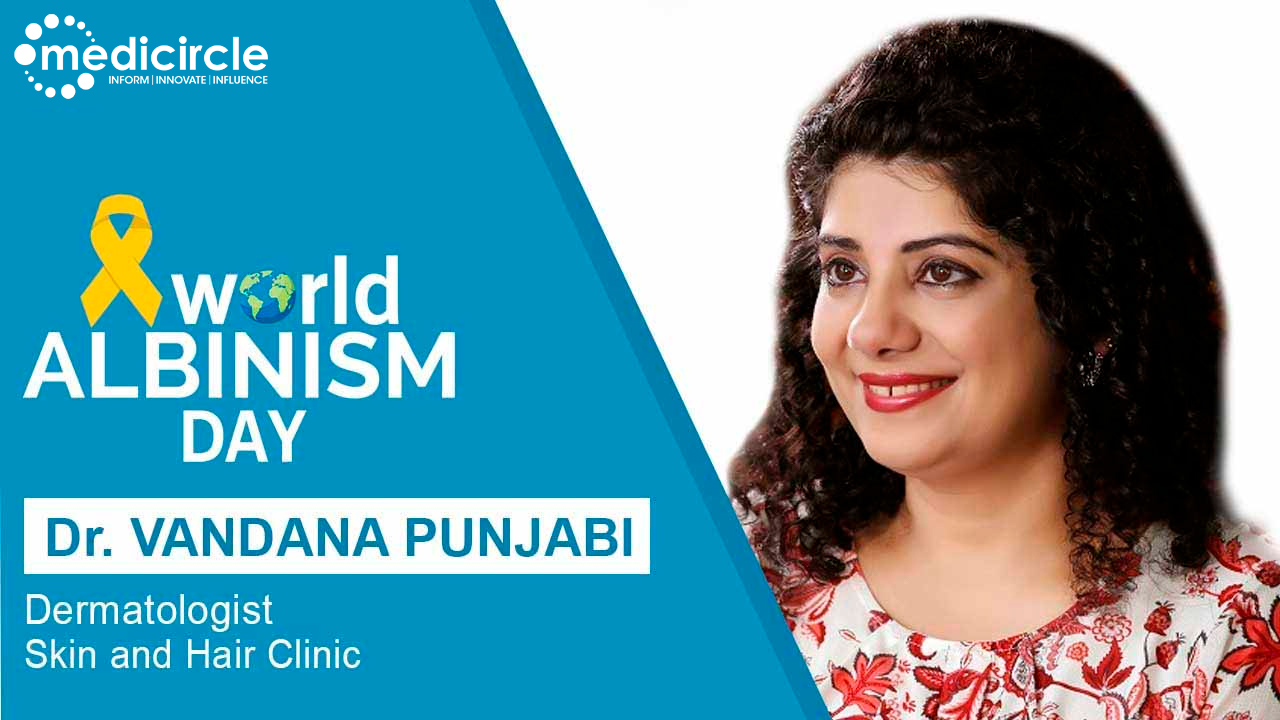Albinism is a rare disease, according to the National Institutes of Health (NIH). It is characterized by a lack of melanin pigment in skin, hair, and eyes. Those with this condition are vulnerable to sun exposure as it increases the chances of skin cancer and severe visual impairment. International Albinism Awareness Day is observed every year on June 13th to highlight the rights of those born with albinism and increase awareness about this genetic condition.
We, at Medicircle are conducting a series on this International Albinism Awareness Day to create understanding and prevent any misinformation against those who have albinism.
Dr.Vandana Punjabi is a Dermatologist, Trichologist, and Dermatsurgeon from B.Y.L Nair Hospital Topiwala National Medical College Mumbai with 22 plus years of experience. Currently, she practices in Mumbai as a private clinic and also a consultant at Max Nanavati Super specialty hospital. She has done a fellowship in general dermatology and laser surgery from a reputed National Skin center in Singapore. She has a special interest in clinical dermatology, acne problems, pediatric dermatology women issues, and aesthetic dermatology. She routinely performs specialized procedures such as botox fillers, thread lifts, and platelet-rich plasma therapy. Her expertise lies in managing acne, rosacea, hyperpigmentation, dark circles, hair fall, and other alopecia in both men and women.
Know the real facts about albinism
Dr.Vandana says, “Albinism is a disorder that results from mutations in several genes which are involved in producing a pigment called melanin. This melanin is a substance that gives color to our skin, hair, and eyes. And in fact, in the retina, the melanin plays a very important role for normal vision.”
Types of albinism
Dr.Vandana informs, “Albinism is divided into two types.
Ocular cutaneous
The oculo-cutaneous albinism is where there is a lack of pigment in the skin, hair, and eyes
Ocular albinism
The ocular albinism is where there's a lack of pigment only in the eyes, while the skin and hair may be of normal or near-normal color.”
Albinism has genetic roots
Dr.Vandana states, “Most types of albinism are an autosomal recessive inheritance. There is actually a 25% chance at every pregnancy that the baby will be born with albinism. But there is one type of albinism which is called the extreme type of ocular albinism, where there is a 50% chance of the son having ocular albinism and 50% chance of the daughter being a carrier of the gene.”
Hermansky Pudlak Syndrome
Dr.Vandana states, “People with albinism don't have any problem with mortality. However, there is one condition which is called Hermansky Pudlak Syndrome. In this type of albinism, the patient can have a shortened lifespan because of lung disease or breathing problems.”
Children with albinism might need special care
Dr.Vandana informs, “People with albinism or children with this condition may have vision problems such as reduced sharpness, or rapid involuntary eye movements, and sometimes also increase sensitivity to light which is called photophobia. And All these have to be treated by the pediatric ophthalmologist and depending on the type of visual disability that they may have, they may need a special school.”
Skincare for patients suffering from albinism
Dr.Vandana says, “We do see a lot of patients with albinism or who do know what kind of skincare they should follow because they don't have symptoms. They may have very mild eye defects or normal vision also, but the skin can be very sensitive to light. That is why it's very important to guide such patients. So with albinism, it is important to know about proper skincare like they have to wear protective clothing at all times, especially when they're outdoors, they also have to limit their time outdoors. So avoiding exposure time is a must. They must take care because they have a very high risk of skin cancers. such as melanoma, as you mentioned earlier, so they need to take a lot of care of their skin as follows:
The right protection covering of clothes Limiting the time outdoors in the sunlight Wearing a good sunblock.”
(Edited by Dr.Rati Parwani)

 Dr.Vandana shares important information about albinism and its types. She also mentions the tips for skincare for patients with albinism. A must-read article to know the actual insights of albinism.
Dr.Vandana shares important information about albinism and its types. She also mentions the tips for skincare for patients with albinism. A must-read article to know the actual insights of albinism.










.jpeg)

















.jpg)


